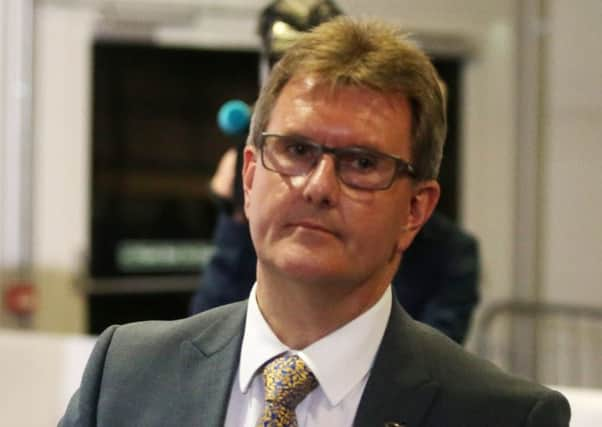DUP will walk out of talks if Dublin starts suggesting solutions: Donaldson


Jeffrey Donaldson, MP for Lagan Valley and the man in charge of party discipline at Westminster, also said that it now looks likely the Province will face a period of direct rule, with no resolution in sight to the DUP-Sinn Fein impasse.
He was speaking after the SDLP on Monday re-iterated a call for both the UK government and the Irish government to jointly put forward their own proposals for how the negotiations deadlock can be broken.
Advertisement
Hide AdAdvertisement
Hide AdIts party leader, Colum Eastwood, had initially issued such a statement on September 11, stating that if no deal was reached by the end of that week, then both governments “should intervene and publish their own joint proposals on what they believe to be a fair deal and compromise”.
Yesterday, he re-stated this call more emphatically, saying both governments must now “forcefully step in to forge a deal that can accommodate both the Irish and the British traditions in the North”, and that parties should then be challenged to either opt in or opt out of whatever their proposals were.
Mr Eastwood said yesterday: “Last week all of us gave the DUP and Sinn Fein space to engage in serious discussions.
“We were asked to believe that the more positive tone and language of this last number of weeks would lead to a breakthrough.”
Advertisement
Hide AdAdvertisement
Hide AdDespite this, he said politicians “have once more run into the same old stalemate”.
Mr Donaldson was asked about the call for the Irish and UK governments to set out a plan for the parties.
He told the News Letter: “Given that most of the issues that we’re dealing with relate entirely to the internal affairs of Northern Ireland, there is no way that we would countenance proposals coming forward from the Irish government.
“Such a proposition would be a fundamental breach of the Good Friday Agreement and the three-stranded approach (the name for the different segments of the agreement, which do not set out any Dublin participation in the government of Northern Ireland), and would bring the talks to an end.
“They cross that line, the talks are over.”
Advertisement
Hide AdAdvertisement
Hide AdHe said the discussions with Sinn Fein are “still at an impasse”.
He would not be specific about the main sticking points, but said that “Sinn Fein’s refusal to form a government without everybody else conceding to their demands” – demands which centre on the Irish language as the “main issue”.
Asked if he can forsee anything happening in the week ahead to break the deadlock, he said: “I don’t. At the moment, I don’t see Sinn Fein backing down and agreeing to form a government.”
He said that “therefore I think we’re headed for a period of direct rule” because “frankly we can’t afford to hang around much longer without a government”.
Advertisement
Hide AdAdvertisement
Hide AdHe said he expects direct rule to kick in “in the next few weeks, when parliament returns”. When that happens, the party “will have to take stock at that stage”.
Parliament is currently suspended during the party conference period, and returns on October 9.
Within the last fortnight, there had been signs that perhaps the chances of a deal emerging between the DUP and Sinn Fein were growing better.
On September 6, Sinn Fein and the DUP had each issued statements – containing similar content, and issued within minutes of each other – which said the two parties had been locked in a spell of “intensified dialogue” (in Sinn Fein’s wording) and “detailed engagement” (in the DUP’s wording) about a solution to the impasse, and that this was set to continue.
Advertisement
Hide AdAdvertisement
Hide AdIn response to the SDLP’s call, the UK government – via the Northern Ireland Office – said: “The UK government, along with the Irish government, is engaging with the Northern Ireland parties to secure the re-establishment of inclusive, devolved government at Stormont, and the operation of all the institutions established under the Belfast Agreement.
“That is our clear objective and we are determined to succeed.”